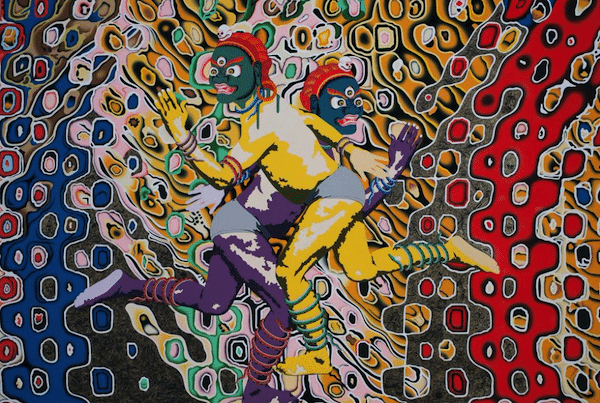Dear friends,
Greetings from the desk of Tricontinental: Institute for Social Research.

Daiara Tukano (Brazil), Mahá – arara vermelha (Mahá – Scarlet Macaw), 2021.
Dilemmas of humanity abound. There is little need to look at statistical data to know that we are in a spiral of crises, from the environmental and climate crisis to the crises of poverty and hunger. In 1993, the philosophers Edgar Morin and Anne-Brigitte Kern used the term ‘polycrisis’ in their book Terre-Patrie (‘Homeland Earth’). Morin and Kern argued that ‘there is no single vital problem, but many vital problems, and it is this complex intersolidarity of problems, antagonisms, crises, uncontrolled processes, and the general crisis of the planet that continues the number one vital problem’. This idea—of the problem being not a sequence of crises, but rather of crises enveloping each other and deepening one another’s impact on the planet—was repopularised in 2016 when it was mentioned in a speech by then President of the European Commission Jean-Claude Juncker. The various crises in the world, he said, ‘feed each other, creating a sense of doubt and uncertainty in the minds of our people’. This feeling of the enormity of the sequence of crises (environmental, economic, social, and political) is captured by the phrase ‘polycrisis’—a singular crisis made up of many crises.
Of course, from a Marxist standpoint, the term ‘polycrisis’ has its obfuscations, since it suggests that these many crises are discordant rather than rooted, ultimately, in the failures of the capitalist system to address them both sequentially and as a totality. For instance, since the Rio Earth Summit of 1992, there have been several perfectly clear proposals to deal with the environmental crisis, including the devastation of the rainforest in the Amazon, but none of these have been enacted due to the grip of capitalist private property over substantial planetary resources and over the public policy architecture both globally and in the various states that have a stake in the Amazon.
Juncker’s observation that the polycrisis creates ‘doubt and uncertainty’ is both correct and disingenuous: while this analysis recognises the sense of doubt that pervades the planet, it then fails to offer anything that resembles an explanation for the emergence of the polycrisis and thereby leaves billions of people unequipped with an analysis of what is causing these many crises and how we can work together to exit them. In that 2016 speech, Juncker, coming from the perspective of the European Christian right wing, said that the European Union’s new proposal for Europe, but not the globe, was to mobilise investment to build infrastructure and improve the general conditions of everyday life rather than creating a ‘world of blind, stupid austerity which many people continue to fantasise about’. No such project emerged. ‘Europe is on the mend’, he said then. But now, as Peter Mertens, the general secretary of the Workers’ Party of Belgium, told me earlier this year, ‘the neoliberal consensus’ continues to suffocate Europe and has plunged the continent into an inflation-led despair that—for now—favours the hard right.

Behjat Sadr (Iran), Untitled, 1956.
One of the elements of the polycrisis is the deepening problems of gender inequality and violence against women. A new report from UN Women, Progress on the Sustainable Development Goals: The Gender Snapshot 2023, has some very troubling numbers. Looking at current trends, the report projects that by 2030, 342.4 million women and girls—an estimated eight percent of the world’s female population—will live in extreme poverty and close to one in four will experience moderate or severe food insecurity. At current rates, the study estimates that 110 million girls and young women will be out of school. Strikingly, despite years of fighting for equal wages for equal work—something that was incidentally established by the Soviet Union in its June 1920 decree on wage tariffs—the wage gap between men and women remains ‘persistently high’. As the report notes, ‘for each dollar men earn in labour income globally, women earn only 51 cents. Only 61.4 per cent of prime working-age women are in the labour force, compared to 90 per cent of prime working-age men’. UN Women, which focused their 2023 report on women 65 and older, shows that in 28 of the 116 countries that submitted data, less than half of older women have a pension. This is truly dismaying. And all the trend lines are going downwards.
In August, the International Labour Organisation (ILO) and UN Women held a seminar in Nepal on the theme of decent employment for women in the care economy. Just as with women in many parts of the world, Nepali women carry out 85 percent of daily unpaid care work, cumulatively spending 29 million hours a day compared to five million hours spent by men. The ILO numbers show us that ‘globally, women perform 76.2 percent of [the] total hours of unpaid care work’. In Nepal, almost 40 percent of women said that they could not seek employment because of the lack of alternatives to their unpaid care work, such as government crèches, according to government data.

Saurganga Darshandhari (Nepal), Delight, 2015.
Of course, the reason for the gender wage gap and for the unpaid care work gap is the enduring grip of patriarchy, which must be dealt with through concerted struggle. Here, we can learn from the institutional changes implemented in socialist states, which use part of their social wealth to build structures to socialise care work such as neighbourhood childcare centres, after-school programmes, and eldercare social centres. Childcare centres not only absorb part of the unpaid care work at home; they also provide children with the necessary social and educational skills for their later years. Earlier this year, the UN Children’s Fund (UNICEF) called for greater social insurance schemes that included childcare centres. Decades of neoliberal austerity cuts have eviscerated whatever basic social protections existed in capitalist states, while right-wing claims to be ‘pro-family’ have simply meant increasing the pressure on women to stay home to provide unpaid care work. At the root of the dismaying figures is not only patriarchy, but what many of the polycrisis elements have in common: that the social system of capitalism is driven by the class that controls property privately and that refuses to allow social wealth to emancipate humanity.
During the People’s War (1996—2006) in Nepal, Nibha Shah, a young woman from an aristocratic family, joined the Maoists in the forest. There, fighting for justice in her country, she wrote a series of poems, including one, in 2005, on the tenacity of birds. It is a poem that teaches us that it is not enough to harbour hope in building a better future; we must be certain that we will overcome this polycrisis, this disaster of capitalism, through audacious struggle.
People only saw the tree fall.
Who saw the nest of the little bird fall?
Poor thing!
A home she built one twig at a time.
Who saw the tears in her eyes?
Even if they saw her tears, who understood her pain?The bird didn’t give up,
didn’t stop hoping,
didn’t stop flying.
Rather, she left her old home
to create a new one, collecting again
one twig, another twig.
She is building her nest in a redwood.
She is guarding her eggs.The bird didn’t know how to lose.
She spreads flight into new skies.
She spreads flight into new skies.
Warmly,
Vijay

